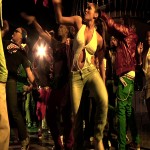
As the country’s murder rate reaches gastronomical (yes, I meant gastronomical and not astronomical, as we are full to overflowing and totally fed up), I have waited for someone to get up and point the finger at the usual culprit, Jamaican popular music. Actually, it is dancehall that usually gets the blame, not Jamaican popular music on a whole.
I have waited for some well-thinking member of society to say ‘aha, it is those deejay fellows pushing gun violence again, I have waited for someone to trot out a couple lines from a song and say that this is the root cause of violent crime issues. I have waited – happily – in vain.
For the accustomed outcry against the usual suspect is not taking place this time. No one has laid the blame squarely at the feet of the older generation of Bounty Killer and Ninja Man, among others, or the middle generation of Mavado and Vybz Kartel, or the new guns like Masicka. Instead what we have had is Minister of National Security Robert Montaque, pointing out how many guns are flowing into the country, even as the police’s Get the Guns campaign is racking up figures. Still, Tanya Stephens did say in The Other Cheek “the youths dem a get 2000 guns fi every one oonu seize/Instead of treating the symptoms why don’t you cure the disease?”
As I have written previously in this newspaper, there are songs that speak about the availability of guns in sections of the society which do not make them. Little Hero deejayed “no gun no make dung deh, dung inna de ghetto, a Babylon sen’ dem dung deh an now gunshots a echo.” Or, as Morgan Heritage sang in Guns in the Ghetto (featuring Bounty Killer, no less):
“Don’t blame my people for the guns in the ghetto
A yu bring dem dung deh, bring dem dung deh”

So what has changed? A lot. There has been the realization that the Tivoli Incursion did not work as a means of stopping killing with killing and now that generation of those who experienced May 2010 in West Kingston as children are all grown up and bitter. Vet butter and very well armed. There has also been the scamming in western Jamaica, especially Montego Bay and its environs, with the resultant gun play. So in addition to the availability of guns, in the two sections of the island where there is a concentration of murder, there are obvious factors – one state related, the other traceable to a cause outside of Jamaican popular music – which explain much of what is happening.
Then there is Protoje’s Blood Money, part of a reggae revival movement which provides a consistent body of work which contradicts notions of a single-minded violent music output. In Blood Money Protoje points out the connection between materialism and mayhem and corruption, concluding “blood money run Jamaica.”

Of course, I am not ecstatic that there are other obvious factors aside from dancehall to point finger at. I am also aware that there continues to be a connection between lawlessness and lyrics. But the absence of arguments against dancehall in the state if the nation’s crime indicates to me that there is a realization it is not business as usual and, surprise, surprise, we may just get somewhere with an objective discussion. Just maybe.


You must log in to post a comment.